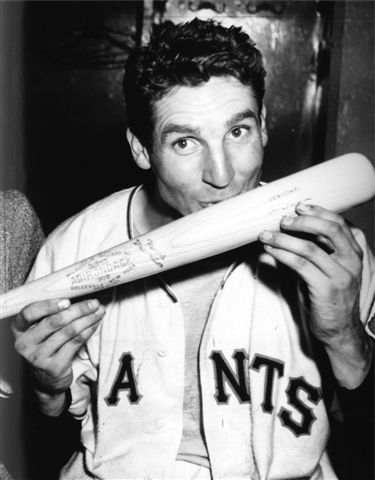When these years later Branca told Maglie that his fastball to Thomson was meant to set up a curve, the Giant pitcher snapped: "Dago, if you wanted him to hit the curve, why didn't you throw him a fucking curve?"
Pages 314 and 327, "The Echoing Green", a 2006 book by Joshua Prager
______________________
Rube Walker (died December 12, 1992, age 66) SABR bio:
In Brooklyn, Walker backed up future Hall of Famer Roy Campanella and, after Campy was injured, Walker was behind the plate for Games Two and Three of the playoff series against the New York Giants. The series ended with the famous Bobby Thomson home run off Ralph Branca in the bottom of the ninth of the decisive third game, and years later Rube said that pitch was supposed to be a brushback, but “Branca didn’t get the ball far enough inside.”1
1 New York Daily News, December 15, 1992.
______________________
Branca's catcher was quoted as describing the pitch as a brushback in what was probably an obituary published about thirty years after Branca is quoted in the one and only spot in the Prager book it's mentioned. That this was not investigated further by Prager is odd at best, maybe because it essentially turns his verbose morality play into soap opera.
Victim Branca intended to intimidate Thomson, who turned that intent against the intimidator. Ironic.
So finally there is corroboration in one spot from the pitcher and the catcher that the home run pitch was supposed to have been a brushback.
October 3, 1951: The Giants win the pennant!
SABR article was written by Scott Ferkovich
(Dodgers up 4-2 bottom 9, one out, runners on second and third.)
The Giants were managed by Leo Durocher ...
Next up, Bobby Thomson. To face him, Dressen brought in Ralph Branca. The Brooklyn righty had been the starter in Game One, giving up a homer to Thomson but pitching well in a 3-1 loss.
Gordon McClendon was calling the game on radio for the Liberty Broadcasting System. “Boy, I’m telling you!” he declared. “What they’re going to say about this one I don’t know!”2 Branca somehow sneaked a fastball down the middle for strike one. “A ball I should have swung at,” Thomson, a fastball hitter, admitted later.3
 At 3:58 pm, Branca’s second pitch, another fastball, came in high and tight. Thomson swung, his uppercut driving the ball deep toward the corner in left. Pafko, dashing toward the high wall, ran out of room. The ball landed in the first row, just above the 315 ft. sign for a three-run home run. Game over. The Polo Grounds shook as the euphoric crowd erupted. Joe King wrote in The Sporting News, “(Thomson’s homer) touched off scenes in this place which never before had been witnessed in connection with the winning of a pennant.”4
At 3:58 pm, Branca’s second pitch, another fastball, came in high and tight. Thomson swung, his uppercut driving the ball deep toward the corner in left. Pafko, dashing toward the high wall, ran out of room. The ball landed in the first row, just above the 315 ft. sign for a three-run home run. Game over. The Polo Grounds shook as the euphoric crowd erupted. Joe King wrote in The Sporting News, “(Thomson’s homer) touched off scenes in this place which never before had been witnessed in connection with the winning of a pennant.”4
3 Ray Robinson, The Home Run Heard ‘Round the World (Mineola, New York: Dover Publications, Inc., 2011).
_________________________
Thomson had homered off Branca two days before ... in Brooklyn. Branca lost BOTH games that Brooklyn lost of those three extra games to decide the pennant. BOTH losses were on game winning home runs by Thomson: 4th inning road, 9th inning home.
If Thomson knew what was coming, it makes you wonder why he didn't swing at the first pitch...
Then a brushback? Did the Giants steal that information, and if so, why the heck wasn't Thomson backing away?
__________________________
Two pitches from Ralph Branca to Bobby Thomson in that final 1951 confrontation:
- Thomson takes one right down Broadway for strike one.
- Branca intends to brushback Thomson but makes such a terrible pitch that Thomson hits it for a pennant winning home run instead.
Hardly the stuff of legend. Or moral outrage.
Showing posts with label Signs.

No comments:
Post a Comment